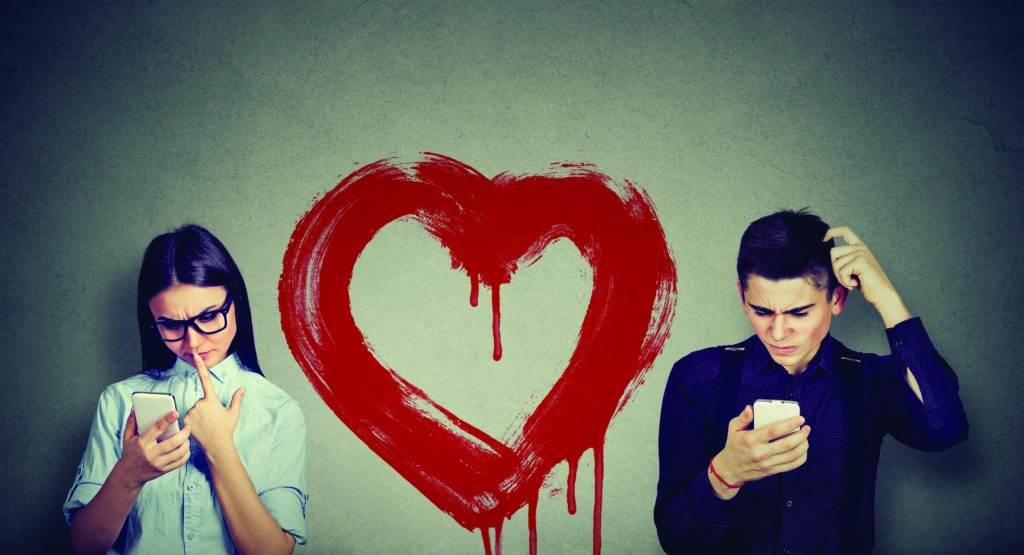Millennials and the Lost
Art of Romance
BY CHAS AUGUST
“Are you two dating?” I asked a 20-year-old. She looked at me strangely and replied, “Dating? What’s dating? Nobody ‘dates’ anymore,” and rolled her eyes.
“Are you seeing anyone?” I asked a 25-year-old guy. “There’s a WOW (World of Warcraft) girl I like a lot. Sometimes we text, sometimes we FaceTime,” he tells me. “Have you actually met her?” I ask. “I don’t really know how to do that,” he says.
“Are you guys a couple?” I asked one of the millennial members of our family and a friend she had invited to Thanksgiving. “We’re hanging out,” she explained.
“Hey, you two, how’s the relationship going?” I asked a twenty-something couple I’ve known for a few months. “We exchanged last names,” one of them told me proudly.
As a longtime sex educator, relationship coach, and workshop leader, I am noticing a sea change in the world of romance. Statistically and anecdotally, people are having sex at later ages compared to my era. Between 2011–2013, 44% of female teenagers and 47% of male teenagers aged 15–19 reported having had sexual intercourse. According to surveys by the National Centers for Health Statistics, this represents a 14% decline for females and a 22% decline for males over the past 25 years. The good news is that teen pregnancies and STIs have also declined.
Sadly, the majority of public high schools have quietly canceled some or all dances, including proms. The reason? Lack of participation. High schoolers would seemingly prefer to interact on their digital screens rather than meet under the watchful eyes of chaperones at the school gym.
In a Wall Street Journal blog (A-Hed) Nicole Hong writes, “Now that smartphone apps are the primary way people meet, some things have become too awkward to ask . . . Many millennials say asking directly for a last name on a first date feels awkward and signals too obviously they intend to scour the internet for biographical information . . . Others say that downloading a date’s entire digital footprint—armed with the full name—can stop a relationship from developing organically.”
If the media is accurate, we have a digital generation of disconnected young people who’ve never taken dance lessons or dressed up for the prom. Nor have they gone bowling together, slow danced with someone they had dreamed of being with, attended a make-out party, or parked at a secluded spot to round some bases. As a result, too many young people feel isolated, lonely, and less apt to create lasting friendships and love relationships. Articles and surveys abound blaming the Internet, the patriarchal rape culture, “helicopter” parents, online porn, the media, our schools. These all contribute to the mournful isolation I observe.

Where are young people learning to socialize? Many aren’t. The ever-present screen creates the illusion of friendship and the fantasy of relationship but bypasses the risks of actual intimacy. The Hollywood romance they witness just doesn’t transpire like that in real life. The sex mis-education they receive from ubiquitous porn sites offers dangerously bad models for real-world sexuality. The fear of sexual abuse is polarizing and freezes normal exploration. Lately I’ve been hearing clients and participants say that in their efforts to avoid any hint of sexual harassment they feel unable to speak a compliment, start a conversation, or initiate a contact. The increased isolation amid young people aggravates this problem.
Perhaps you’re wondering about that 44-47% of teenagers 15-19 years old who are having sex. There we see a related but different phenomenon. Romance seems to have been
replaced by “hook-ups.” These are brief uncommitted sexual encounters between individuals who are neither romantic partners nor dating each other. It’s as if the digital generations, not ready or willing to learn the complex and confusing lessons inherent in emotional intimacy, have bypassed dancing, wooing, dating, and kissing to relieve their urge-to-merge with NSA (no strings attached) sex. For too many young people, the experience of hookup sex with someone with whom you’ve barely had a conversation will likely foster feelings of sexual harassment and abuse.
The good news is that humans are unlikely to cease forming capital-R Relationships or intentionally reproducing, and families are unlikely to fade from the Earth. We’re just starting the intimacy and mating dance at an older age. Without all that teenage practice many millennials in their twenties and thirties are being challenged to learn basic skills like kissing, asking for a date, bringing sex to a platonic relationship, being a couple, etc. Why is learning in adulthood more difficult? Because a teenager’s mistakes are more easily forgiven as “baby steps” versus the way adults are judged.
Scattered amid all the isolation of the Internet one can still find “meet-up” groups, dance communities, and drop-in dance lessons. There are hundreds of videos on how to ask someone out, how to ask for a kiss, the meaning of consent, how to host a dinner party, how to propose marriage, and much more, including where to find a relationship coach—a promising career given the inherent human clumsiness that defines the digital era.
Chas August has led more than 300 personal growth workshops and leadership trainings, including as a HAI Global (HAI.org) facilitator (1991-2008). To learn about his private practice as a Life, Relationship, and Intimacy Coach and how he can support you in person or via online sessions, visit ChasAugust.com.